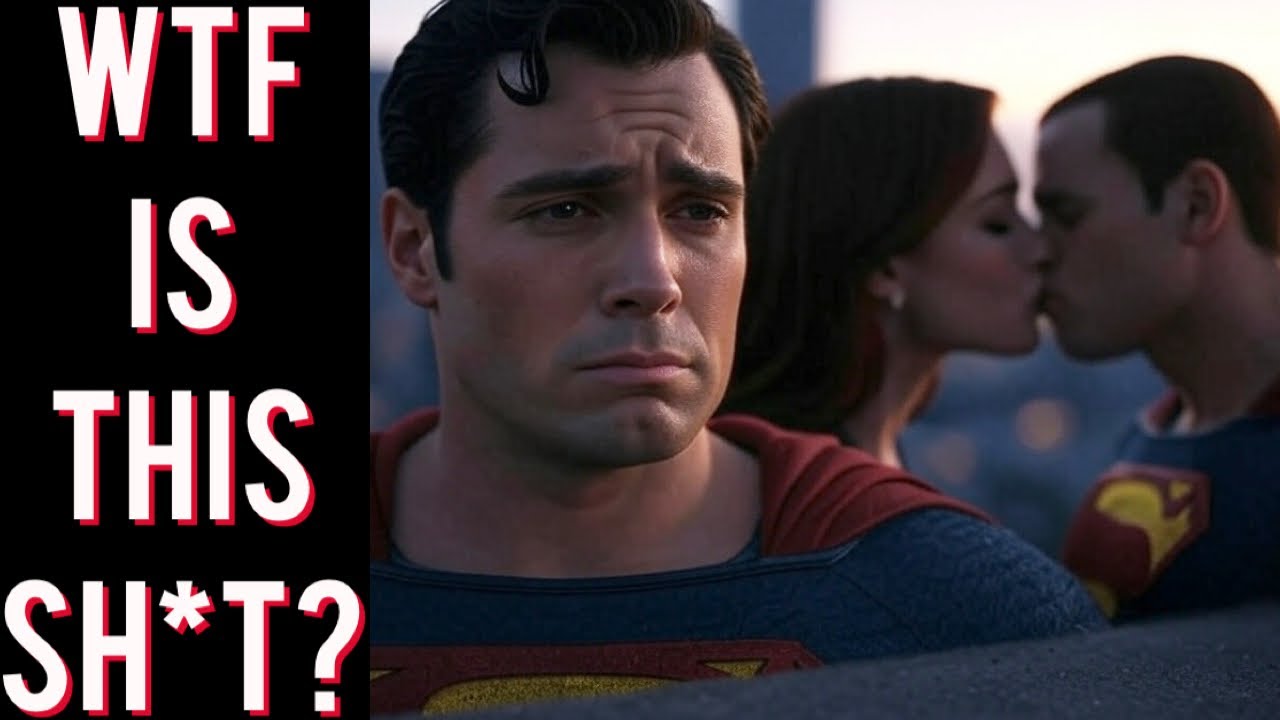The superhero cinematic landscape is no stranger to controversy, but the latest buzz surrounding James Gunn’s upcoming Superman film, set to kick off the newly restructured DC Universe (DCU), has sent shockwaves through fandoms worldwide. A rumor, now reportedly confirmed by pop culture commentator Nerdrotic, suggests that Gunn, the acclaimed director behind Guardians of the Galaxy and The Suicide Squad, is steering the Man of Steel toward a vision crafted for “modern audiences.” This phrase, often loaded with implications about cultural shifts and creative priorities, has sparked heated debates among fans, with some praising Gunn’s bold direction and others questioning whether he’s deliberately alienating half of Superman’s loyal fanbase. What does this mean for the iconic hero, and why is this move generating such intense discussion? Let’s dive into the heart of this cinematic storm.

The Rumor That Lit the Fuse
The rumor first gained traction when whispers emerged that Gunn’s Superman—slated for release on July 11, 2025—would prioritize themes and storytelling designed to resonate with contemporary sensibilities. Nerdrotic, a prominent voice in geek culture commentary, reportedly confirmed these speculations, framing Gunn’s approach as a deliberate pivot toward appealing to a specific segment of viewers. The term “modern audiences” has become a lightning rod in pop culture, often associated with efforts to diversify narratives, update traditional characters, or address current social dynamics. For some, it signals progress; for others, it raises concerns about straying from the essence of beloved icons like Superman.
Gunn, who co-heads DC Studios alongside Peter Safran, has been tasked with rebooting the DCU after years of inconsistent films under the previous DCEU banner. His Superman film, which he is writing and directing, aims to reintroduce Clark Kent as a younger hero navigating his dual identity as a Kryptonian and a human raised in Smallville. David Corenswet stars as the titular hero, with Rachel Brosnahan as Lois Lane and Nicholas Hoult as Lex Luthor. The project is positioned as the cornerstone of the DCU’s “Chapter One: Gods and Monsters,” a slate that promises a cohesive vision for DC’s heroes. But the suggestion that Gunn is focusing on “owning half the audience” has fueled speculation about his creative choices and their potential to divide fans.
Decoding “Modern Audiences”
What exactly does “modern audiences” mean in the context of Gunn’s Superman? While specific plot details remain under wraps, the phrase likely points to a storytelling approach that reflects today’s cultural landscape. Superman, created in 1938 by Jerry Siegel and Joe Shuster, has always been a symbol of hope, truth, and justice. Over decades, his stories have evolved to address changing societal values, from post-World War II optimism to Cold War anxieties. In recent years, superhero films have increasingly embraced diverse casts, explored complex moral dilemmas, and tackled themes like identity and inclusion. Gunn’s track record suggests he’s comfortable blending irreverent humor, emotional depth, and bold narrative choices, as seen in his work with Marvel and DC.
The “modern audiences” angle could involve updating Superman’s world to reflect contemporary issues—perhaps exploring Clark’s outsider status in a polarized society or emphasizing Lois Lane’s role as a fearless journalist in an era of misinformation. Casting choices, such as Isabel Merced as Hawkgirl and Nathan Fillion as Green Lantern Guy Gardner, hint at a diverse ensemble that could broaden the film’s appeal. Additionally, Gunn’s decision to focus on a younger Superman, early in his heroic journey, might aim to connect with younger viewers who see the character as a relatable figure grappling with purpose and responsibility.
However, the rumor that Gunn wants to “own half the audience” has raised eyebrows. Some interpret this as a strategic choice to prioritize progressive themes, potentially at the expense of traditional fans who cherish Superman’s classic portrayal as a steadfast, apolitical hero. Others see it as a pragmatic move to carve out a distinct identity for the DCU in a crowded superhero market dominated by Marvel. The debate has spilled onto social media platforms like X, where fans are passionately discussing whether Gunn’s vision will honor Superman’s legacy or alienate longtime supporters.
The Fan Divide: Hope vs. Skepticism
Superman fans are a diverse group, spanning generations and perspectives. For some, Gunn’s approach is a breath of fresh air. His ability to blend heart, humor, and spectacle has earned him a loyal following, and many trust he’ll deliver a Superman who feels both timeless and relevant. The emphasis on “modern audiences” could mean a film that speaks to younger viewers, particularly Gen Z and Millennials, who value authenticity and social awareness in their heroes. A Superman who confronts real-world challenges—climate crises, technological disruption, or global unrest—could resonate deeply in 2025.
On the other hand, skepticism abounds among fans wary of change. Superman’s enduring appeal lies in his simplicity: a hero who does what’s right, no matter the cost. Critics of the “modern audiences” approach fear that Gunn might overcomplicate the character with trendy themes or dilute his universal appeal to cater to a niche demographic. The phrase “own half the audience” has fueled concerns that the film could prioritize one ideological camp over another, risking the alienation of fans who see Superman as a unifying figure. Posts on X reflect this tension, with some users hailing Gunn’s vision as “the future of DC” and others warning that “Superman shouldn’t be a culture war pawn.”
James Gunn’s Vision: A Balancing Act
Gunn has a history of navigating fan expectations while pushing creative boundaries. His Guardians of the Galaxy films turned obscure Marvel characters into household names, blending quirky humor with heartfelt storytelling. The Suicide Squad and its spin-off Peacemaker showcased his knack for reimagining flawed heroes with irreverence and humanity. For Superman, Gunn has promised a film that honors the character’s legacy while offering something new. In public statements, he’s emphasized his love for Superman as a symbol of kindness and optimism, suggesting that the film will retain the hero’s core values.
The challenge lies in balancing innovation with tradition. Superman’s mythology—his Kryptonian heritage, his Smallville upbringing, his romance with Lois—offers rich material for a fresh take. Gunn’s decision to exclude an origin story, focusing instead on Clark’s early days as a hero, indicates a desire to explore uncharted territory. The inclusion of other DC heroes, like Mr. Terrific (Edi Gathegi) and Metamorpho (Anthony Carrigan), suggests a broader DCU tapestry, positioning Superman as a launchpad for interconnected stories. Yet, the “modern audiences” rumor has amplified scrutiny of every creative choice, from casting to tone.
The Bigger Picture: DCU’s High Stakes
The Superman film is more than a standalone project; it’s the foundation of the DCU’s ambitious reboot. After the DCEU’s mixed track record, with hits like Wonder Woman and misses like Justice League, DC Studios is under pressure to deliver a cohesive, crowd-pleasing universe. Gunn and Safran’s “Gods and Monsters” slate includes projects like The Brave and the Bold (Batman), Supergirl: Woman of Tomorrow, and Swamp Thing, each aiming to offer distinct flavors of heroism. A successful Superman could set the tone for years of interconnected storytelling, while a misstep risks undermining fan confidence.
The “modern audiences” debate reflects broader trends in the entertainment industry. Superhero films, once a guaranteed box-office draw, now face audience fatigue and rising expectations. Marvel’s recent struggles with films like The Marvels have highlighted the challenges of keeping viewers engaged. DC, with a fresh start under Gunn’s leadership, has an opportunity to differentiate itself by blending bold creativity with respect for its iconic characters. Whether Superman can bridge the divide between old-school fans and new viewers remains to be seen, but the conversation around it underscores the passion that the Man of Steel inspires.
Why It Matters
The uproar over Gunn’s Superman isn’t just about one film; it’s about the future of a cultural icon. Superman has always been a mirror for society’s hopes and fears, from his Depression-era origins to his post-9/11 resurgence. In 2025, as the world grapples with division, uncertainty, and rapid change, the question of who Superman is—and who he’s for—feels more urgent than ever. Gunn’s gamble to target “modern audiences” could redefine the hero for a new generation or spark a backlash that overshadows the DCU’s launch.
For now, the rumor mill continues to churn, amplified by voices like Nerdrotic and countless fans on X. Whether you’re excited for a fresh take or wary of change, one thing is clear: Superman is poised to be one of the most talked-about films of 2025. As the release date approaches, the world will be watching to see if Gunn can deliver a Man of Steel who soars above the controversy.





